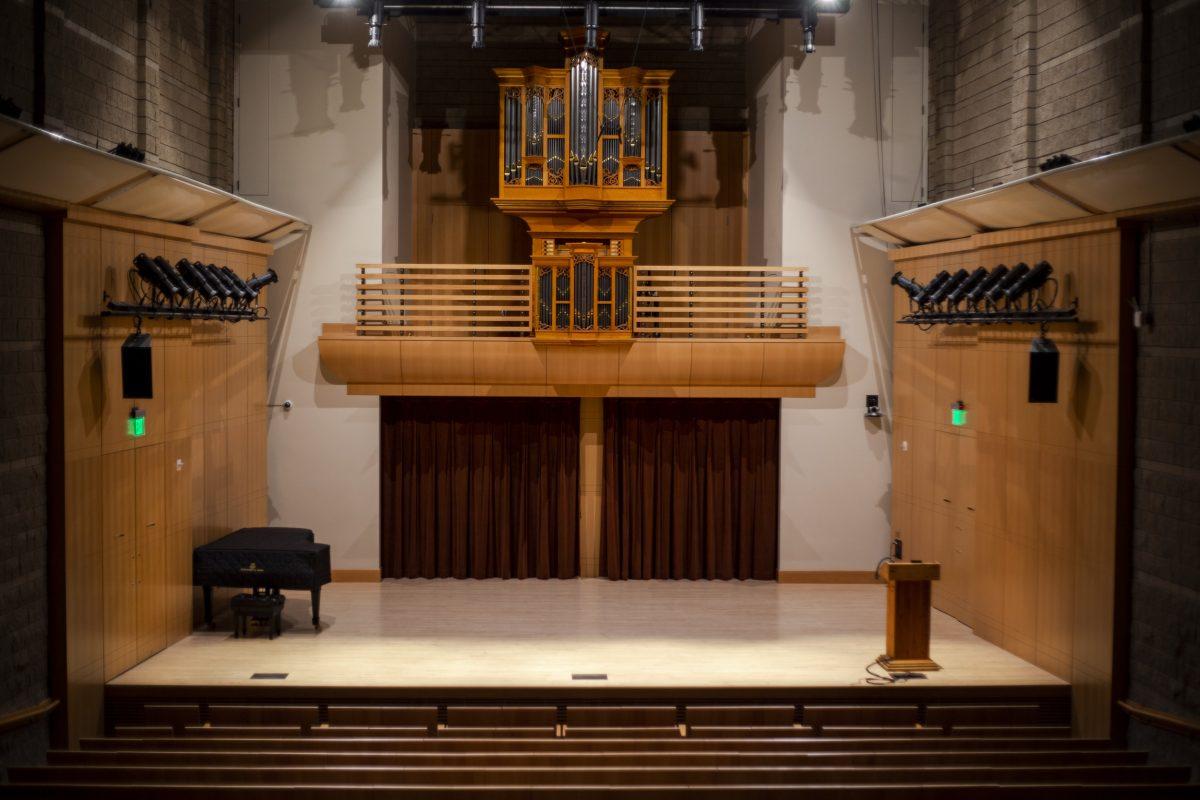We all know what a concert is, but what about a concerto? Of course, adding the ‘o’ right at the end of the word gives it a completely different context.
Rather than gathering around to watch an artist perform a single or a band play a set list, the audience watches in awe as a soloist or duet performs a piece written for a solo instrument or a vocalist with an orchestra right behind them. How can someone discern what a concerto sounds like?
Well, luckily, students at Sonoma State University and the surrounding community can gather in the Green Music Center, where it will be hosting its fourth annual concerto competition on Sunday, April 7, at 7:30 p.m. The competition is free to anyone who would like to come and watch Sonoma State Music students perform during the evening inside the beautiful Schroeder Hall.
Schroeder Hall will be hosting the Concerto competition on April 7. (STAR // Brandon Sparks)
The instrumental and vocal competition will include about 10 to 15 contestants, who will have the choice to play their own instruments or sing to the crowd, guided by a pianist who plays a reduced symphonic version of the orchestra for their piece. Instruments range from the woodwind and brass family to the string family and piano, with vocalists as well.
The Sonoma State Orchestra Director, Alexander Kahn, has been the man behind the stage directing and showcasing the competition for the past three years. In fact, he was the one that kickstarted the competition ever since he arrived at Sonoma State back in 2015.
“You know, when I started it, I wasn’t actually sure if people would actually sign up or whether it would work out. But, it was pretty easy from the beginning,” Kahn said. “Even the first year we did it, we had a good response.”
He was right, and the numbers have continued to grow. However, Kahn believes in quality over quantity. Not a lot of students sign up for the competition, but that’s okay.
“It’s already kind of a small number of people who are going to be in that position. And keeping it small makes it a fun evening,” Kahn said. “I’ve been other places where the concerto competition can be lots and lots of people, but the actual competition itself tends to be like a flop.”
Sitting through 20 to 30 entries can be tiring, said Kahn, and being able to sit through a competition that is more tight-knit with less entries is more enjoyable. The audience’s attention is focused more within the span of an hour as opposed to three hours, and therefore the experience is more satisfying overall.
Preparing for the competition is no walk in the park and former concerto winner and trombone player JJ Mayer can attest to this. He and his performing partner, Spencer Causey, practiced a piece made for two french horns but was doable on trombone and they both practiced the piece from start to finish three hours a day for two weeks. Then, it was only a matter of time before they had walk out onto the brightly-lit stage.
Although Causey was confident, Mayer said he was a nervous wreck. Even though he had a big band rehearsal on the same day of the competition and cracked on the first note during the competition, he and Causey flourished.
“This competition had a really big impact on my musicianship,” Mayer said. “I was more of someone who liked to sit in the jazz band and play my part. I didn’t really like to get up and solo.”
Needless to say, stage fright is part of the process and it only makes the students better musicians.
“I think it’s a great experience for students who have that experience of playing a concerto from start to finish to see if they can learn an entire concerto and play it in front of an audience in a high-stress situation,” Kahn said.
Even if Schroeder Hall’s audience only fills up a third of the room, the pressure for the performer is still existent. Friends, family, community members of Rohnert Park and music students gather to watch these brave musicians as they show of their vocal and instrumental talent.
Kahn, Santa Rosa Junior College Orchestra Director Jerome Fleg and Credo High School Orchestra Director Richard Loheyde are the three judges for the competition. The judging criteria is actually quite simple.
Kahn said that it is really about being able to create a mood and being able to shine in front of the orchestra, rather than being judged based on hitting all of the right notes. The performers need to be able to put themselves out there in front of a large ensemble. So, the judges think of themselves as audience members, trying to put themselves in the shoes of a standard observer.
There can be multiple winners and those who win have the opportunity to play with the actual Sonoma State Symphonic Orchestra the following semester with the concerto piece they played beforehand. A monetary incentive has been considered for winners in the future, but Kahn believes that being able to play with the orchestra is a more valuable experience.
Nevertheless, all the contestants are winners in their own right since each musician who signed up in the past were so dedicated and talented with their craft. Kahn hopes that more people can witness the talent of these individuals and the experience is nothing short of extraordinary.
“There’s nobody who I didn’t enjoy listening to. Not a single performance where I thought ‘ugh,’ you know? Like this person maybe shouldn’t have signed up or shouldn’t have tried to play.”
He said that everybody who plays, plays at a high enough level to be in the event anyways. Given enough wonderful talent and a variety of instruments, this is a concert, or rather a concerto, that cannot be missed.




































